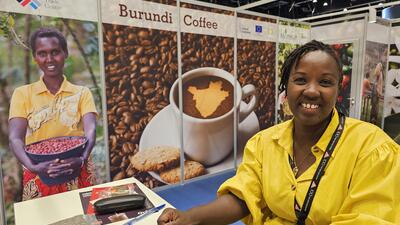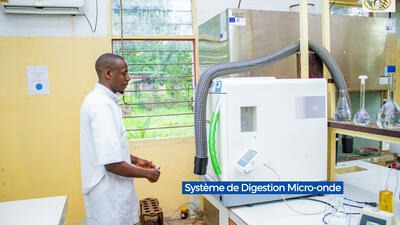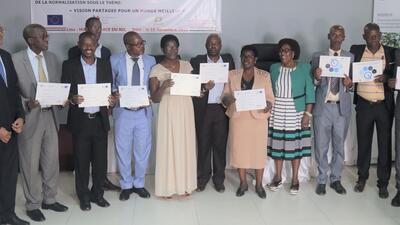Unlocking potential: Cambodia, Burundi, Turkey
The 2011 World Export Development Forum explored how least developed countries can make tourism work towards poverty reduction.At the 2011 World Export Development Forum (WEDF), high-level leaders from Burundi, Cambodia and Turkey spoke about experiences in their countries.
Grasping the opportunity – Burundi
The small nation of Burundi made a big impression on the global tourism industry earlier this year. At the famous Internationale Tourismus Börse (ITB – the biggest tourism trade show worldwide) in Berlin, Burundi showcased some of its natural beauty and unique culture – winning the title of Best African Exhibitor. This success demonstrates the country’s potential to attract tourists and build an industry that could create income opportunities for some of the nation’s 8.2 million people, explained Burundi’s Trade Minister H.E. Ms. Victoire Ndikumana.
An increasing number of tourists are looking for cultural or adventure experiences and many least developed countries (LDCs) – rich in natural and ethnic heritage – can deliver these types of holidays. LDCs, with their young populations who need decent jobs, education and training, also have a lot to gain from this growing tourism trend. ‘It is increasingly clear that tourism is a growth area for many LDCs. However, its development requires the mobilization of significant resources capable of meeting the needs of the sector in terms of legislation, capacity building, infrastructure, and marketing, among others,’ Ms. Ndikumana added.
As Burundi emerges from 12 years of civil war, Ms. Ndikumana said the government has adopted a four-pronged strategy to seize the potential of tourism in the country. The strategy includes efforts to consolidate peace by expanding income opportunities generated through tourism to marginalized and rural areas. It also includes developing tourism sites and working with other countries in the region to manage assets and ease travel restrictions for tourists. Finally, the strategy also focuses on strengthening partnerships between the public and private sectors.
‘This strategy was developed in partnership with the private sector, civil society and specialized agencies of the United Nations because tourism is seen as a promising sector that could leverage economic growth thanks to the socio-economic ripple effect that it could have on related sectors,’ Ms. Ndikumana said.
Commitment from government and private sector leadership – Turkey
Over the past three decades the tourism industry in Turkey has boomed. Between 1980 and 2010, tourism receipts grew from US$ 300 million to US$ 20.8 billion. And the industry continues to grow. The Union of Chambers and Commodity Exchanges of Turkey (TOBB) is the highest legal entity representing the private sector. The Union predicts tourism revenue will reach US$ 45 billion by 2020. Hasan Arat, the Vice President of TOBB, said the combination of government support and private investment is the key to Turkey’s success.
Turkey’s experience provides valuable insights for LDCs. ‘Establishing a safe and somewhat politically neutral global reputation has allowed private tourism companies to open new business channels in western countries previously unfamiliar with Turkey,’ Mr. Arat said. ‘Turkey’s infrastructure investments into airports, railways and maritime transportation have also paid immense dividends towards the growth of tourism in the country.’
Another key factor behind Turkey’s success was the bringing together of some of the country’s leading private-sector influencers and decision-makers into one organization known as the Tourism Sector Assembly of Turkey. Its main objectives include: identifying problems and corrective actions, preparing sectorial reports and forecasts, organizing symposiums, conferences and forums to encourage sectorial developments, and coordinating meetings with government officials and related public authorities.
‘This level of coordination and dedication to advance tourism in Turkey has led to numerous public-private partnership successes, including: hosting the Trabzon 2011 European Youth Olympic Festival and the Mersin 2013 Mediterranean Games, along with creating the Belek Tourism Center and Belek Tourism Investors Union, the Istanbul Shopping Festival, Universiade 2011 Erzurum Winter Games and 2012 Istanbul World Indoor Championships in Athletics,’ the Vice President said.
Extending opportunities to entrepreneurs in rural areas – Cambodia
It is largely accepted that development without equity is unsustainable. For tourism to work against poverty, it is critical for LDCs to ensure that the associated income opportunities reach rural areas, where often the majority of poor or marginalized people live. H.E. Mr. Tina Dith, the Under Secretary of State for the Ministry of Commerce of Cambodia, said he believed that partnerships between the government in Cambodia and the private sector are driving success in this area.
To improve income opportunities for rural people – especially youth – the government, international donors and the private sector fostered Les Artisans d ‘Angkor company, a company producing stone and wood carvings, lacquer and silk products, and supplies these products to the tourism and export markets.
Millions of people visit Cambodia every year to experience the ancient culture of this South-East Asian country. But decades of civil war destroyed knowledge about traditional arts and crafts. Since 1998, Les Artisans d’Angkor has trained thousands of young people and helped them find work using ancient arts and crafts. This effort is helping to revive Khmer culture and gives young people new employment opportunities.
‘The Government is now looking at what Cambodia can do to further utilize the tourism sector,’ Mr. Tina Dith said. ‘One approach will focus on creating a competitive and well-organized silk sector that can generate income and employment to reduce poverty for 20,000 people along the silk supply chain. With support from international donors and agencies, including the International Trade Centre, over 500 weavers were recently trained. The techniques they acquired allow them to produce better quality goods faster. Producing higher quality products faster also means a better price for the consumer,’ he concluded.
To help promote the weavers’ work, the Ministry of Commerce has set up a showroom in the capital for six months, while staff from 11 companies and non-governmental organizations was trained in marketing, design and export procedures. ‘In 2010 the government also suppressed import tax for raw materials and the VAT (value-added tax) to make Cambodian silk products more competitive,’ Mr. Dith explained.
These high-level representatives agreed that investing in infrastructure, reaching out to marginalized people, and involving the private sector are key ingredients for successfully making tourism work against poverty in LDCs.











